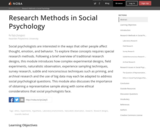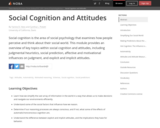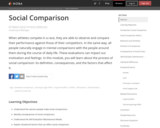
Text and links to all ancillary materials for Module 51
- Subject:
- Psychology
- Social and Behavioral Sciences
- Material Type:
- Module
- Reading
- Teaching/Learning Strategy
- Author:
- Donelson R
- Date Added:
- 05/31/2021

Text and links to all ancillary materials for Module 51

Social psychologists are interested in the ways that other people affect thought, emotion, and behavior. To explore these concepts requires special research methods. Following a brief overview of traditional research designs, this module introduces how complex experimental designs, field experiments, naturalistic observation, experience sampling techniques, survey research, subtle and nonconscious techniques such as priming, and archival research and the use of big data may each be adapted to address social psychological questions. This module also discusses the importance of obtaining a representative sample along with some ethical considerations that social psychologists face.

How important are first impressions? Do you ever make judgments about others? Do you feel that others judge you? In this session, we will focus on our impressions of others and ourselves and examine the extent to which our environment and culture can influence us. We will also discuss autism.

What is social psychology? What is the relationship between attitude and behavior? In this lesson, we will study how the people around us influence our feelings, thoughts, and behaviors, and learn "how funny we are as humans in our desire to fit in." We also will go over two of the most famous experiments in psychology: the Stanford Prison Experiment and the Milgram Obedience Experiment.

This course is designed to familiarize you with the major theory and research surrounding the study of small group communication and provide an opportunity to analyze and develop solutions to a community problem while working in a small group.

Text and links to all ancillary materials for Module 48

Text and links to all ancillary materials for Module 49

Purpose
The failure to recognize the power of a situation or social context on other’s individual behavior and instead attributing the behavior to the person’s state or personality is referred to as the fundamental attribution error. The fundamental attribution error is most commonly committed in individualistic cultures that promote a focus on individual achievements verses communal relationships.
Social psychologists argue that people’s behaviors, thoughts, and attitudes are strongly influenced by their social settings, situations, and interactions with others. Thus, understanding the role of the social world on behavior is critical and is the central tenant of social psychology. The purpose of this project is to broaden your understanding of the social forces that influence individual behavior and examine the impacts of social settings, groups, and scripts on everyday life.

This course examines interpersonal and group dynamics, considers how the thoughts, feelings, and actions of individuals are influenced by (and influence) the beliefs, values, and practices of large and small groups. Learning occurs through a combination of lectures, demonstrations and in-class activities complemented by participation in small study groups and completion of homework assignments.

Test Banks 1 out of 3 for (Stangor & Walinga text; MIT Open Courseware). Topics include: Introduction to Psychology, Science and Research of Psychology, Brain Structure, Brain Function, Methods of Brain Research, Vision, Consciousness, Attention, Memory, and Learning. Questions formats include multiple choice, short answer, fill in the blank, anatomical identification, short essay,

Test Banks 2 out of 3 for (Stangor & Walinga text; MIT Open Courseware). Topics include: Memory, Learning, Language, Thinking, Intelligence, and emotion and motivation. Questions formats include multiple choice, short answer, fill in the blank, anatomical identification, short essay,

Test Banks 3 out of 3 for (Stangor & Walinga text; MIT Open Courseware) Topics include: Personality, Child Development, Adult Development, Stress, Psychopathology, Social Psychology, Evolutionary Psychology, and Happiness. Questions formats include multiple choice, short answer, fill in the blank, anatomical identification, short essay,

This textbook presents core concepts common to introductory social psychology courses. The 8 units include 27 modules covering key social psych topics such as research methods, group processes, social influence, and relationships. This book can be modified: feel free to add or remove modules to better suit your specific needs. The book includes a comprehensive instructor's manual, PowerPoint presentations, a test bank, reading anticipation guides, and adaptive student quizzes.

A brief introduction to the psychological experience of aggression. Duration: 2:37

A brief introduction to the psychological concepts central to the constructs of attitudes and persuasion in social situations. Duration: 2:25.

This video introduces important phenomena observed in social situations: conformity, compliance, and obedience. Duration: 2:37.

A short but effective explanation of the fundamental attribution error, a tendency to attribute others' behavior to individual characteristics instead of situational factors. Duration: 5:22.

An introduction to the important constructs to know in relation to prejudice and discrimination in social psychology. Duration: 3:22.

A brief description of prosocial behavior and the major issues related to prosocial behavior. Duration: 3:11.

An introduction of the concept of self-presentation, and the different social roles we take on as individuals. Duration: 1:20.